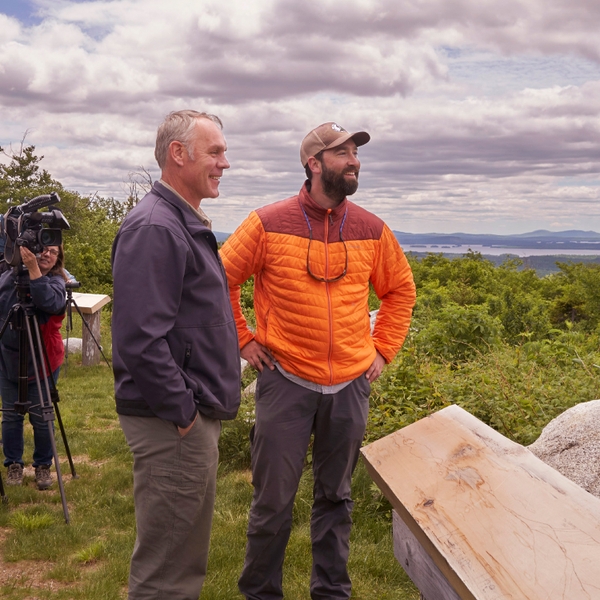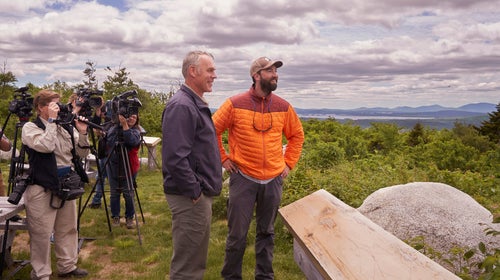Lucas St. Clair Turns Recreation into Political Capital
The Democratic candidate and son of the Burt's Bees founder is seeking a win in Maine's rural 2nd District with a simple message: The recreation economy can bring back jobs
New perk: Easily find new routes and hidden gems, upcoming running events, and more near you. Your weekly Local Running Newsletter has everything you need to lace up! .
When Lucas St. Clair woke up at Lunksoos Camp, on the East Branch of the Penobscot, and discovered that Ryan Zinke’s staff had TPed his tent, he knew his plan was working. It was a chilly June morning in 2017, the end of the Secretary of the Interior’s visit to Maine’s Katahdin Woods and Waters National Monument, one of 27 that President Trump was considering dismantling. Zinke had been met with vociferous protests at monuments like Utah’s Bears Ears and Grand Staircase-Escalante in May 2017. St. Clair decided to take a different approach to protect the 87,500-acre monument he had worked for five years to create out of land purchased by his mother, Burt’s Bees founder and philanthropist Roxanne Quimby.
He encouraged supporters to show up at the airport with welcome signs and to be seen hiking, biking, and even plein-air painting in the monument when Zinke visited. The 40-year-old St. Clair personally toured the secretary through Katahdin Woods and Waters: fishing his favorite stream, canoeing the East Branch of the Penobscot, and camping at the Lunksoos Camps. The charm offensive seemed to work—Zinke’s staff pranked the affable St. Clair by wrapping his backpacking tent in toilet paper, and the secretary told the press, “From what I hear, I think all sides love the land, everyone appreciates public access, and everyone appreciates that jobs matter. And who cannot say this is a beautiful site.” When the secretary’s review appeared in December, Grand Staircase-Escalante was cut in half and Bears Ears was shrunk by two-thirds; Katahdin Woods and Waters was left unmolested. “I knew we had to appeal to his ego,” St. Clair says.
The saga of Katahdin Woods and Waters has been widely told. Quimby began purchasing the timberlands just east of the Appalachian Trail’s northern terminus on Mount Katahdin almost two decades earlier, but she encountered stiff opposition from locals to her plan to turn the property into a national park. Many saw that as a threat to the region’s traditional logging and paper-milling industries, as well as an emblem of federal government overreach. Worse, Quimby’s approach was uncompromising and tone deaf—more grassfire than grassroots. “Ban Roxanne” stickers were pasted onto bumpers across Maine’s northern “woodbasket” region.
In 2011, Quimby passed the baton to St. Clair, one of her twin children. (His sister, Hannah, is director of the Quimby Family Foundation.) Over the next five years, in an effort to reverse public opinion, he met with a majority of the 10,000 or so residents of the towns surrounding the proposed monument. He met a grocery store owner in the walk-in cooler because the owner didn’t want to be seen talking to St. Clair. When people insulted his family or the proposed monument on Facebook, St. Clair knocked on their doors and asked to have a face-to-face discussion instead. His approach, which he calls the “happy warrior,” is based on projecting warmth, open-minded listening, and, he says, “fighting for what I feel is right while remaining optimistic that we can both get what we want.” The message was almost always that the new monument could revitalize the economy of the region, which was struggling with the paper industry’s collapse.
It worked. By August 2016, President Obama felt there was enough local support to designate Katahdin Woods and Waters a national monument. That consensus was strong enough to withstand Trump’s work to pare public lands, but it is almost completely absent from national political conversations.
St. Clair thinks he has a solution to that as well: He’s now running for Maine’s solidly purple, almost entirely rural 2nd Congressional District, which includes the monument. If he wins the June 12 primary, St. Clair will face Republican incumbent Bruce Poliquin, a fierce monument opponent. With the economic power of outdoor recreation at the core of St. Clair’s campaign, his candidacy is a test of whether the business of the outdoors really can unite our country’s bitter partisan divides.
It’s a clear March Sunday in Farmington, Maine, and St. Clair is greeting guests at the first of the day’s three campaign events. About 30 people have appeared at an afternoon house party in the slanting, book-filled 1857 farmhouse of O. Henry Prize–winning writer Bill Roorbach. The guests removing their shoes at the front door include several college professors and the mother of Olympic gold-medalist snowboarder Seth Wescott. St. Clair, in socks, stands next to a large woodstove. He is tall—six foot five—with thick dark hair and a trim black beard and is wearing a shawl-collared fisherman’s sweater.
“I grew up in Dover-Foxcroft,” he says, a Maine town practically in the middle of the state. “My parents were back-to-the-landers who had $5,000 in savings and wanted to buy 30 acres,” St. Clair tells the crowd “Maine was the only place you could do that.” That was 1974, and his parents spent several years clearing their property and building a saltbox house with hand tools. Lucas and Hannah were born in 1978 and raised in that house, without running water or electricity. “My mother describes her parenting style as ‘benign neglect,’” he says, to laughs. “It was a magical way to grow up, playing in the woods from dawn to dusk, using our imaginations, and lighting a kerosene lamp to read.”
In variations of the stump speech I saw him give five times over two days, he always starts with the story of his austere northern Maine childhood—the family was on food stamps for a few years in the 1980s—in order to combat his opponents chief critique that he is a rich pretty boy “from away,” as they say in Maine.
As St. Clair continues his speech, he talks about how the twins’ parents split up in 1983. “A year later,” he says, “my mother was hitchhiking home from her job as a waitress at the Dexter Motor Lodge when she was picked up by a beekeeper named Burt, who gave her some honey and beeswax. She used the wax to make stove polish and candles and eventually hit on the idea of lip balm. The rest, as they say, is history.” That history: Quimby grew the company over the next 23 years and in 2007 sold it to Clorox for $913 million.
By then, St. Clair had hiked the Appalachian Trail, taken a NOLS semester course in Patagonia, attended culinary school in London, owned a restaurant in Maine, and ridden his motorcycle to Seattle to woo his now-wife, Yemaya, whom he’d met during the NOLS semester. The couple started a family in Washington, and St. Clair worked as a fly-fishing guide and sommelier before deciding to move back to Maine to take over the foundering Katahdin Woods and Waters campaign.
What worked in that campaign—and what he’s banking on in this one—is that St. Clair is warm and funny in front of crowds, even as he takes on serious issues. On gun control questions: “I’m a duck hunter, and by law I’m only allowed three shells in my gun,” he says. “That’s a gun control law we’ve been living with for years. So why do we allow people to put 45 high-caliber bullets into a semi-automatic weapon? Are we prioritizing the lives of ducks over our children?”
It’s not charisma or wit that will get him elected in Maine, though—it’s a focus on jobs and the economy. Northern Maine is Trump country—he won the 2nd District by 11 points, elected by those most impacted by the decline of shoe, textile, and paper manufacturing jobs. Once an employer of 5,000 people, East Millinocket’s closed in 2008; by 2014, the population had plunged 42 percent. Parts of the district have had unemployment rates pushing 20 percent.
St. Clair’s solution, and the heart of his stump speech, is business innovation based on Maine’s strengths, much like his mother’s success in building a small Maine agricultural business into an international brand. “Maine’s natural beauty is a powerful, renewable resource,” he says. Upon taking over the monument campaign in 2011, one of St. Clair’s first actions was commissioning an economic analysis to prove that donating the land to the park service could revitalize the region’s faltering economy. That analysis, by Headwaters Economics of Bozeman, Montana, found that Katahdin Woods and Waters could create as many as 450 jobs and spur “new travel and tourism activity; the ability to attract people, retirees, and businesses across a range of sectors; economic growth including higher-wage jobs; and increases in non-labor sources of income.”
In just two years, that prediction is already proving true. Hotel bookings are up. Long-slumping real estate sales have risen 30 percent for two years running. New businesses are opening, including two guide services, Millinocket’s Turn the Page bookstore and wine bar, and the Design Lab, a four-person marketing firm that opened in 2015 in a former Oddfellows Hall. St. Clair likes to say that the outdoor recreation economy isn’t just “making burritos and renting bicycles; it’s attracting high-end businesses whose employees want to live in Northern Maine for the outdoor recreation lifestyle. Design Lab moved to the northwoods even though Maine has the 49th slowest internet in the country.” Everyone in the room nods.
The most pressing topic for primary voters, however, is how he plans to beat current officeholder Bruce Poliquin. Reelected in 2016, Poliquin is the only Republican congressman in New England and a stepping-stone in the Democrats’ quest to take control of the House this fall. Polls show St. Clair in a neck-and-neck race for the June 12 primary with Jared Golden, a state representative and Marine Corps veteran of the gritty sort the Democratic Party has been grooming to recapture voters who flipped from Obama to Trump in the last election. If there’s any edge in the race, it’s that the Bangor Daily News, the region’s largest newspaper, last week based on his work on the monument.
“We ran the monument campaign directly at Bruce Poliquin, and we won,” St. Clair tells 100 people assembled in a school lunchroom for the Franklin County Democrats’ monthly meeting. “Most of our campaign staff worked on that initiative. We know his vulnerabilities. We know his staff. We know how he behaves. We know how to beat him.”
Poliquin, along with senators Olympia Snow and Susan Collins, opposed Katahdin Woods and Waters, as did Maine’s bombastic Tea Party governor Paul LePage, who still wants to rescind it. Only Chellie Pingree, the Democrat representing Maine’s more urban, coastal 1st District, supported the plan. Mike Michaud, a former Great Northern Paper Company worker and Democrat who represented the 2nd District before Poliquin, also opposed it—at least he did at first. “After listening to Lucas, I said that I wanted to see an economic analysis to see what kind of impact a monument might have.” When he did, Michaud was convinced.
It’s those conversations that St. Clair is banking on—even if they’re not always pretty. Upon purchasing the land she intended to donate to the park service, one of Quimby’s first acts was to close it to uses the paper companies had always allowed but were incongruent to her idea of a national park: hunting, snowmobiling, and leases on vacation cottages. Quimby evicted people from cottages that had been in their family for decades, and then burned them down. One cottage belonged to Peter Ellis’ father. St. Clair traveled to meet Peter and his brother John in the family market’s walk-in cooler. It was one of hundreds of meetings he scheduled with people living near the proposed park.
“If someone is close enough to drive their finger into your chest, they are close enough to have a conversation,” St. Clair says of those meetings. Of the dozens of people I interviewed for this story, every one of them pointed out St. Clair’s remarkable unflappability and eagerness to communicate even with angry opponents. “I always try to focus on the 80 percent we agree on,” he says.
It’s a trait St. Clair has had since he was a boy. “Lucas was always an optimist,” Quimby says. “I ask him if criticism from opponents bothers him. He says, ‘No, they just don’t know me yet. If they knew me, they’d have a different opinion.’”
St. Clair convinced his mother to reinstate hunting and snowmobiling on half the land. “That was the turning point for me and a lot of people,” Peter Ellis says. “After a lot of discussion, I felt like I could trust that the park would do right by locals.” Eventually, when Zinke showed up, the Millinocket Chamber of Commerce wrote a letter in support. St. Clair’s campaign rallied supporters to show the interior secretary how much the monument was wanted. Even Congressman Michaud, the former East Millinocket mill worker, came around. “Lucas did a great job addressing people’s concerns. I’m glad it was designated a monument.”
On my last day on the campaign trail with St. Clair, I witness the happy warrior in person. It’s the second-to-last stop of this three-day, ten-stop swing: a visit to a popsicle stick and medical swab factory in Guilford. What St. Clair and his field manager expected would be a standard hard-hat tour of the factory floor turned into a formal, and tense, audience with the company’s CFO, president, and co-owner of the 100-year-old business.
When we arrive, we are ushered into the conference room to talk to company CFO Scott Wellman, who is as tall as Lucas but with a shaven head. Wearing a white button-down shirt, Wellman gives us a quick rundown of the company and its problems: finding people to work (“People come in for two weeks, and then they quit”), electricity (which is exorbitantly expensive), and locating supplies of birch trees for the popsicle sticks (a byproduct of logging evergreens for paper and lumber—a sputtering industry in Maine, as St. Clair well knows). “We wanted to know where you stand on things,” Wellman says.
“Power isn’t going to get cheaper,” St. Clair says. “There will be a carbon tax in my lifetime—it’s happening in Canada; it’s happening in the European Union. We have to stay ahead of the curve and invest in things like wind, solar, and biomass generators.”
Then James Cartwright, the company co-owner, brings up the new monument. “I’m 62 years old. I’ve seen every damn tree in the state,” he says. “If you were going to pick 100,000 acres in Maine to make a park, that’s the last goddamn place I’d pick. The only thing up there is eight-inch-wide spruce trees.”
Suddenly, St. Clair is grinning. It’s the same argument Governor LePage had used when asking for the monument to be rescinded, telling a congressional committee that tourists would never visit the monument, which was in “the mosquito area.”
“You should come up there with me sometime,” St. Clair says, smiling. “Wassataquoik Stream is the most remote stream in the state, beautiful, with granite substrate. There are 7,000 acres of silver maple spanning the river.”
“If it was on the coastline somewhere, it could have been so much better for business,” Cartwright says. “Look at all the shops and hotels around Acadia [National Park.]”
“I think it’ll come,” says St. Clair, hitting his stride. “In 2016, 700 people drive Loop Road. In 2017, after monument status, 30,000 people drove it.” He describes how four new businesses have opened, and how, already, real estate sales and prices have risen and bookings are up at area hotels. “The folks at Shin Pond Village didn’t like me at all,” St. Clair says, referring to a hotel catering to snowmobilers. “We figured out a path forward together, and now they are big fans of the monument. And I’m big fans of theirs because they were willing to take the time and have open and honest conversations.”
Cartwright nods and says, “Right,” his demeanor softening.
“At the end of the day, a lot of this is about trust,” St. Clair says. “I want people to think I’m an honest broker. I’m sure there are things we disagree on.”
“What gave you that impression?” Wellman says, and everyone laughs, the tension gone. “Whoever is representing the 2nd District, we want to be able to call them,” he says. “It sounds like you’d be the same way.”
St. Clair is late for his next appearance and hustles to the car. “That was great,” he tells me, a swagger in his step. “It doesn’t get much more fun than that.”


